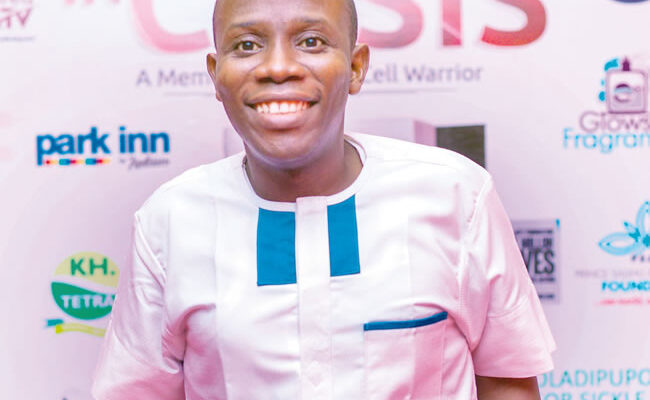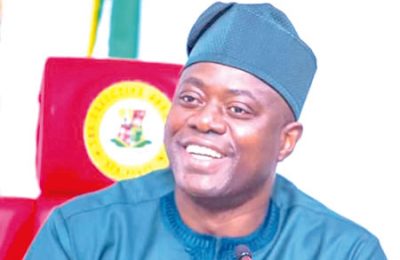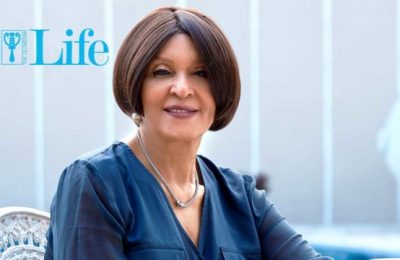Dotun Oladipupo is a contract lecturer at the Moshood Abiola Polytechnic, an advocate of sickle cell and President of the Oladipupo Foundation for Sickle Cell. In this interview with IFEDAYO OGUNYEMI, he speaks about sharing and raising the hopes of people living with sickle cell and his personal experience. Excerpts;
You’re one of the 100,000-150,000 people living with sickle cell disease in Nigeria. How do you cope with SCD while trying to live your life as a Nigerian?

It’s difficult enough to live as an average Nigerian, especially in this time of surviving and not truly living, it is extremely difficult to live as a person living with sickle cell and nearly impossible if you have suffered telling complications of sickle cell.
It is a race for survival with grace to live up to a certain stage when you now have a family to cater for in spite of your restrictions and health incapability in a society where the majority are either unemployed or underemployed and have to “hustle” more to meet their needs. If you now add the state of the country’s healthcare architecture, the affordability and accessibility together with the society’s pronounced and cryptic discrimination masked in sympathy rather than empathy, it is an extreme sport to live with sickle cell in Nigeria.
A couple of years ago, you came public as a sickle cell patient. What exactly pushed you to that point?

I’ve always been public with my state of health, it’s just that it hasn’t been as frontally as it has been in the last 5/6 years because I’ve been running an NGO on sickle cell since 2010 so people who are close to me personally or have worked closely with me have always known. In fact, I am always on the electronic media doing public engagements and enlightenment on it as a person living with sickle cell. The difference in the last few years is that I felt sickle cell has taken all it can take from me and when you feel there is nothing to lose again except life which everyone will eventually lose, you’ll want to come all out to live it, fight it and perhaps help others beat it far beyond the point you can, that was the difference recently. And having gone past the shame of it a very long time ago, the best one can do is to live a life where you make an impact on the very thing that has tried to put you below the ground all of your life.
How have you fared since the completion of your surgery?
I initially felt pretty well but when you just came out of a bilateral hip replacement, replacing both of your hips in a society that is not PWD sensitive and access to public buildings, banks, and work environments are not disability-friendly, you are bound to put more pressure than permissible on your implants and that will put the implants at a high risk of early failure and eventual difficulty in coping with the demands of everyday living and surviving. For instance, most workplaces, service buildings, and public transportation in the country are not disability friendly, this becomes a very great challenge.
What kind of support did you get from your place of work before, during and after your surgery?
Initially, I can say only a few people at work who had one or two things to do with the NGO had an idea that I live with sickle cell. In fact, the majority of my superiors didn’t know because it never impeded my work schedule and that is one thing with people living with sickle cell; we want to do our tasks efficiently enough so no one will put the lapses at the feet of our health. So it was up until the month I got badly sick and couldn’t return to work on time that some of them sought to know what kept me out for that long, it was at this point they began to ponder if I had sickle cell.
But during the entire crisis, they gave support at their individual levels and might, nothing more. After the surgery, it became a matter of great consideration to be reabsorbed back at work but for the school head at the time who understood that I have a life to live and a family to feed, I got reabsorbed gradually. I had to undergo occupational therapy to function as optimally as possible, I also had to brace up to learn how to face the students again albeit as a completely different person physically.
In what way(s) did your health experience affect your life and family?
Sadly, in a more tragic way than I envisaged. It has had an impact on my family life, marriage, parenting, everyday living and regretfully in areas where I used to help and function but cannot function properly or function at all. The impact is negatively enormous and puts me to tears daily. It is depressing that a once very active, independent man has now become tragically dependent to get some basic things as simple as wearing trousers. I cannot be in some places because of complications of sickle cell, it is sad. If I have to dwell on this alone, it will take all day but they are better left unsaid.
You also wrote a book about your journey with SCD. What inspired you to write this book?
My latest book on sickle cell “A Warrior In Crisis’’ is a memoir of my sickle cell experience within the almost two years I was bedridden and vegetative because of multiple complications of sickle cell, chief of it which is avascular necrosis of the hip femur and other skeletal complications. I had to document the experience because it is typical of what an average African family goes through from the acceptance of it as a medical situation, to desperate solutions seeking through worship centres to traditional centres and the complexities of how we handle and deal with the very testing situation at the time. The rigours of crowdfunding, traversing between various hospitals, clinics and possible solution centres, the psychological and emotional impacts on wife, child, siblings, friends and parents and the kind of support system that eventually made us through the troubles, this I thought is worth sharing so everyone and anyone going through any kind of life crisis whether it has to do with sickle cell or not can learn from, get motivated from and keep hopes alive to come out triumphantly. It was written to also acknowledge the support and kindness of strangers, individuals and people who came through.
How would you describe the kind of attention that SCD is getting from stakeholders and government at all levels?
I’ll say very poor. We have a pretty bad healthcare system yet the government is not giving social support to people living with sickle cell in the area of health insurance and subsidies because sickle cell is very expensive to manage. Government is not also giving people living with sickle cell some concessions in the area of job opportunities, there is nothing wrong if a percentage of job opportunities is reserved for qualified persons living with sickle cell rather than joining the entire pool in order to go through the often very tedious recruitment process like everyone else. I think we can do better as a nation if all state assemblies can enact the sickle cell rights laws to curb discrimination and abuse of people living with sickle cell as well as provide opportunities for them.
ALSO READ FROM NIGERIAN TRIBUNE







